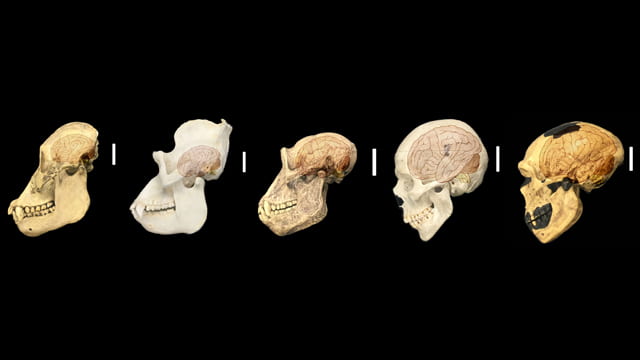SciShow
Hosted by: Stefan Chin
Transcript:
I don’t like to brag, but I’ve got a pretty big brain.
And so do you.
Compared to gorillas and orangutans — apes that are about our size — our brains are
three times as massive.
That extra size is likely a big part of what lets us us fly to the moon, write piano concertos,
and make YouTube videos.
But exactly how we got these bigger brains has puzzled scientists for a long time.
Like, what happened, genetically, to make a more neuron-packed brain?
Well, we may finally have a clue.
Two teams of American and European researchers announced yesterday in the journal Cell that
they’ve identified a gene that helps increase the number of neurons in brains — and it’s
only in humans.
The gene is called NOTCH2NL, and it’s not just in our genomes once, but three times.
One of the teams stumbled upon it when they were doing experiments with organoids.
Organoids are simple miniature organs that are grown using stem cells in Petri dishes.
They’re a bit closer to the real thing than regular cell cultures, because they’re grown
to make 3D structures.
And scientists find mini brains especially useful for studying the earliest stages of
brain development.
In this case, they were wondering which genes were getting turned on and off.
And it turned out that NOTCH2NL was one that was very much “on” in human organoids.
Even more importantly, there was no NOTCH2NL signal in organoids made from rhesus monkeys.
In fact, the monkeys didn’t even have a NOTCH2NL gene when the researchers checked.
Now, there are plenty of genes that are specific to humans that aren’t doing critical things.
But the finding was intriguing.
Especially because orangutans didn’t have NOTCH2NL either.
Chimps and gorillas have DNA that looks like a NOTCH2NL gene, but those versions can’t
actually make proteins.
They’re what scientists call pseudogenes.
Meanwhile, we have three functional copies, plus a fourth that doesn’t work.
By comparing these species’ DNA, geneticists think that way back in our evolution, like
8 to 14 million years ago, a gene called NOTCH2 got partially duplicated.


Recent Comments